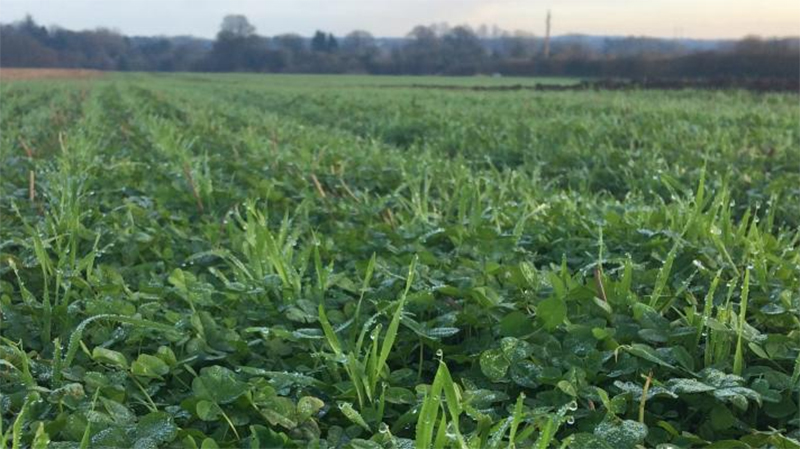
The group is aiming to discover whether cash crops can be successfully grown in a permanent clover understory (living mulch) to control weeds and fix nitrogen. A key question is whether this can be achieved without significantly affecting yields.
The farmers say that if successful, what they discover could be the ‘holy grail’ for arable farming, offering a way to build fertility without livestock, tillage or synthetic inputs, while sequestering more carbon, cutting costs, and improving productivity.
Both conventional and organic farmers are involved in the trial and are pooling findings and knowledge. The trial is part of the living mulch field lab being run through the Innovative Farmers programme with the support of AHDB, Organic Research Centre and Organic Arable.
“There are two starting points of the group,” says Dominic Amos, who is one of the researchers in field lab and senior crops researcher at ORC. “Some are already practising long term conventional no-till and are looking to reduce chemical inputs, while others are established organic farmers looking to reduce tillage – both farming systems can learn from each other.”
Staffordshire arable grower and contractor, Clive Bailye, is involved in the field lab. Clive practices conservation farming and hopes using living mulch will allow him to eliminate synthetic fertilisers.
“I’ve never really felt able to go fully organic,” says Mr Bailye. “Without livestock in my system we’ve never been able to facilitate that circular farm approach for building soil fertility, as I don’t want to go back to cultivation to control weeds. So, to find out how we can do organic no till, without livestock, is like the holy grail of farming,” he says.
Oxfordshire contract farmer and no-till specialist, James Alexander, has been trialling the living mulch over both conventional and organic land. He hopes the living mulch will reduce weeds and add fertility, and thereby eliminate the need to regularly plough, cultivate, and roll.
“Currently we have to take one third of the organic land out of production every year for clover leys, so we are losing a lot of productivity,” says Mr Alexander. “If the living mulch works though, we could drill directly into it.”
So far, the living mulch in his organic trial is looking promising. “The organic plot is looking really good, and there are no weeds in it,” he says. “There was a very slight increase in barley yield, which was probably a bit down to the clover. At the moment we’ve got oats in the clover and the crop is looking better than on the conventional land.”
In contrast, the clover leys on his conventional land did not establish and he suspects this could be due to synthetic nitrogen residues. He plans to try again this year with a different drill.
Jerry Alford, coordinator of the field lab for Innovative Farmers, adds;
“It is crucial that research into sustainable farming solutions is done on commercial farms so we can see the impacts this approach might have on farm businesses.
“By combining the farmers’ real-world insights with the scientific rigor of the ORC researchers and the AHDB knowledge exchange team, this trial is establishing key practical knowledge which is being put into effect in real time on the farms.”
With the demise of BPS, farming strategies will have to become more innovative and efficient at ‘getting more from less’, adds Paul Hill, knowledge exchange manager at AHDB, and the trial’s coordinator.
“The living mulch methodology certainly fits this bill, helping to reduce variable costs, such as plant nutrition, weed control cost and chemical costs if running a conventional system, with a knock-on effects on fixed costs, including labour requirements, diesel and machinery costs.”
“Along with this, it would protect the environment and reduce the farm business’ carbon footprint, so it should be a win-win strategy,” says Mr Hill
The Field Lab will be benchmarking the costs of using a living mulch strategy, for both organic and conventional no-till systems.
The field lab group attempted to establish their living mulches in Spring 2020, using a seed mix comprising of 70% small leaf white clover, and 30% medium leaf white clover.
“The theory is that the small leaf clover will give good ground cover, and the medium leaf will provide more competition against weeds,” says Mr Amos.
There were four successful establishments, and these growers are now drilling crops into their mulches. Three mulches were not successfully established, and the growers are trying again.
Each farmer is also experimenting in their own way to maximise knowledge gathering.
“James Alexander is comparing establishing the mulch through ploughing versus direct drilling, for example” says Mr Amos. “Mark Lea has trialled a disc drill and tine drill, and Jamie Stephens is looking at the impact of competition from using different seed rates.”
The field lab expects to get its first yield data later this year, but learnings are continual.
“The two key services that need to be delivered for a living mulch system to best contribute to agricultural productivity are weed control and nitrogen supply,” says Mr Amos. But he says a successful living mulch is expected to also deliver:
Interested farmers from across the world have been getting involved via social media, and some are now running their own living mulch trials. AHDB has started a WhatsApp group for sharing knowledge, and 30 farmers are now involved.
